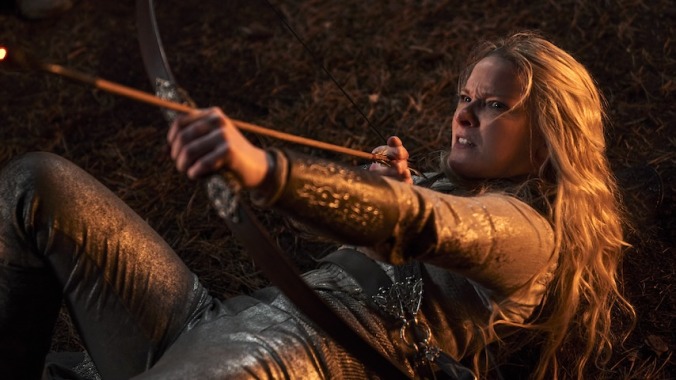The Lord of the Rings: The Rings of Power Season 2 Trades Depth for Spectacle
Photo Courtesy of Prime Video
Prime Video’s The Lord the Rings: The Rings of Power is the most expensive television series ever made. Its hefty price tag is evident in everything from the sheer size of its cast to its detailed, imaginative sets and lush production design. That this series is made from a place of deep and genuine care is evident—let’s face it, no one could make J.R.R. Tolkien’s Middle-earth look this good if they weren’t already at least kind of a nerd about its source material. But as The Rings of Power Season 2 arrives on our screens, its existence asks us, as viewers, to consider what, precisely, an adaptation is meant to be and do.
Is a series like The Rings of Power supposed to interrogate or engage with Tolkien’s text in some significant way or simply attempt to recreate it? What’s more important, the visual scope of the show we’re watching or the heart of the narrative at its center? Should more time be spent on character dynamics or epic battle sequences? How can a visual medium like television best serve the sprawling timelines and many (many!) characters of Tolkien’s original while still keeping things interesting for its audience? (And with just eight episodes to work with!) After an inaugural outing that was largely devoted to the slower work of set-up and character development, The Rings of Power’s second outing seems largely unsure of what, precisely, it’s trying to accomplish.
The story picks up essentially where Season 1 ended: The smith Celebrimbor (Charles Edwards) has successfully forged three magical Elven rings, leaving High King Gil-galad (Benjamin Walker) to decide what to do with them. The Stranger (Daniel Weyman) and Nori (Markella Kavenagh) are traveling to the Eastern kingdom of Rhun to find answers about his mysterious identity. Elendil (Lloyd Owen), the recently blinded Queen Regent Miriel (Cynthia Addai-Robinson), and the remnants of their army have returned home to Numenor to find a dead king and brewing civil unrest. Dwarf prince Durin (Owain Arthur) and his wife Disa (Sophia Nomvete) are beefing with his father. And Galadriel (Morfydd Clark) is firmly in her feelings about the revelation that her human friend—or crush, depending on how you want to read it—Halbrand (Charlie Vickers) was the Dark Lord Sauron in disguise.
With his secret out in the open, Sauron’s quest to forge the rings of power takes on a new and determined urgency as he seeks to exploit problems and exacerbate tensions throughout Middle-earth. The growing political unrest fermenting in Numenor sees the scheming Pharazon (Trystan Gravalle) openly challenging Miriel’s position, while the fallout from mining for mithril continues to destabilize the dwarf stronghold of Khazad-dum. And although the elves are the first group to wield rings of power, they spend most of the season trying to determine whether they should.
In Tolkien’s novel, the Elven rings are made last and, in many ways, in response to the forging of the other sixteen. Here, they are made first, and the switch vastly alters their meaning and position in the larger story. The Elven rings, specifically, are now tinged with a certain level of doubt and uncertainty—no one can be quite sure how much influence Sauron might have had on their creation when he was Halbrand—and both Gil-galad and Elrond are suspicious of and uneasy about their abilities. Even Galadriel herself now seems a bit more tainted and untrustworthy than she did before. (Heck, most of the time she doesn’t even seem certain she can trust herself, and Clark’s performance thrums with doubt and anxiety throughout.)
Season 2 is at its best when it’s poking at the same themes of corruption and complicity that run throughout Tolkien’s works, using the influence of the rings as a convenient shorthand to explore the ways that choices made with the best of intentions can be twisted over time. Adopting a new guise as an otherworldly elf known as Annatar, or the Lord of Gifts, Sauron takes a more direct hand in the creation of the remaining rings, openly manipulating Celebrimbor by appealing to his skill, his vanity, and his desperate desire to cement his legacy. It’s a very different viewing experience to be “in” on Sauron’s deception this time around, and your mileage will likely vary on whether you think it makes for as compelling a narrative device. (A lot will likely depend on how quickly you get tired of Celebrimbor being the absolute dumbest genius in Middle-earth.)
-

-

-

-

-

-

-

-

-

-

-

-

-

-

-

-

-

-

-

-

-

-

-

-

-

-

-

-

-

-

-

-

-

-

-

-

-

-

-

-








































